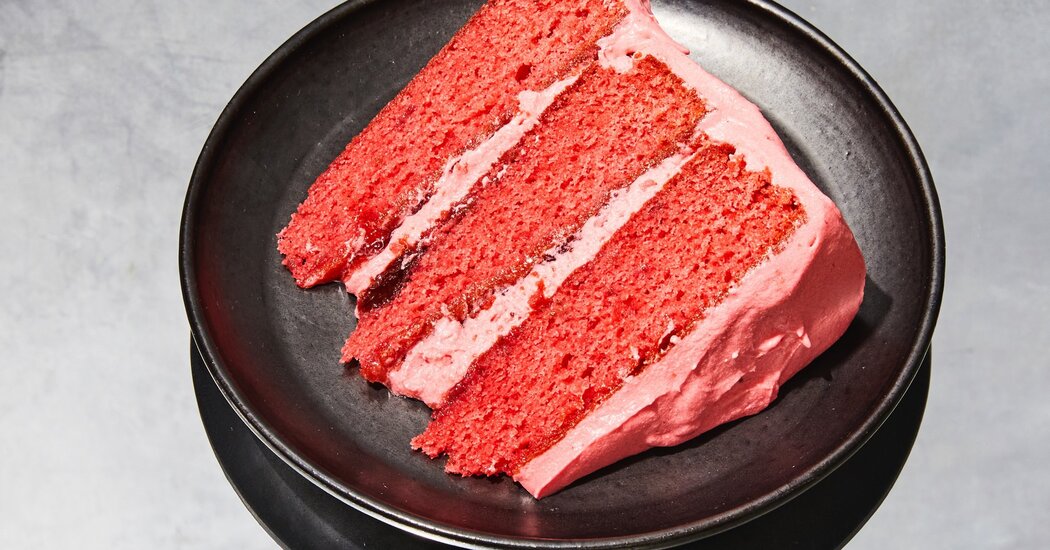In 1976, Johnny Cash released a song called “Strawberry Cake.” It was a bit of an outsider tune, not altogether popular. But to me, it falls well within the canon of simple yet great Americana storytelling.
In an interview, Cash talks about walking past a man sleeping on a New York street while on his way to his hotel. He goes on to say that, after seeing a magnificent strawberry cake on a dessert table in the lobby restaurant, he wondered how to help the man spirit away the whole cake, fully frosted, to have for himself.
Recipe: Strawberry Layer Cake
He thinks better of the idea and, instead, writes “Strawberry Cake.” In the song, a man from the street sneaks into the Plaza Hotel, yearns for the cake and, remembering his days picking strawberries in California and his life leading to that moment, grabs the cake and flies out the side door. He outruns the chef and headwaiter and eventually lands in the bushes where no one can find him. He devours the entire cake in rapture, alone, sated and alive. It does not surprise me that Cash, a fellow Southerner and Nashvillian, chose strawberry cake as an antihero’s coveted prize, or that the cake itself is at the center of a personal reckoning about class.
We Southerners love storytelling, and amid the songs, outsider art and poetry that inhabit Americana are recipes, holding narratives that often don’t seem to matter much in the moment but that actually define much of what it means to be alive.
Amid the songs, outsider art and poetry that inhabit Americana are recipes.
As my own recipes are released into the wild, becoming free of me, I grow more aware of the stories they tell. Each one marks a time and a place (where I was, whom I was cooking for, whom I was cooking with) and a history (my own and others’). When I comb through my archives, I find a lot of joy, some strife and, mostly, a simple love for the recipes’ humanity.
Some are quieter than others. Some are as vibrant as novels. But the richest tales are in my layer cakes. I believe that to be the case for a lot of other Southerners too. Layer cakes are not casual bystanders. Often called church cakes, they nod to both a higher experience and the idea that they, toted in cardboard boxes with no top or Tupperware cake holders, are sacred centerpieces for gathering in our part of the world.
This particular cake recipe also tells a tale. As a chef with strong opinions, I believe you can’t find finer strawberries than the ones in Louisiana come early spring. By April, we Southerners are struck nearly dumb with the abundance of this crop, and we remain that way until early summer, when our berries get a bit waterlogged and overheated. I wanted to see where they came from. I wanted to meet who was growing them. I wanted a 10-hour drive with 13 flats of Camarosas to huff alone in ecstasy to think about how to best serve them. A good number of years ago, I drove down from Nashville to pick up several flats for my pastry kitchen. That drive became part of this recipe.
When the farmer asked what I would do with them, I replied with only two words: “strawberry cake.” He nodded because, well, of course that was what they were meant for. Strawberry cake evokes something big and important to Southerners.
My original was built around those incredible Louisiana strawberries, roasted at high heat and sugared lightly to protect their flavor. It tasted like Smucker’s jam in the summertime.
For me, this is a kind of redemption cake. It calls summer forward, brings us out (and sometimes up) from the cragginess of winter, reminds us that there is life to be had and cake to be eaten. It is also a cake to offer tribute: to a bumper crop from a Louisiana farmer, who gives you a generous “driving stash” for the long ride home; to those you love and care for the most. One that, all hued up like a flower, in some wondrous shade of pink, can both stop people in their tracks and declare a certain kind of tenderness in grief or in love and care. Layer cakes move around this way, from life to life. And so the recipes take the shape of the people who find them, defining small moments and changing with time and place. Here’s a good one for you to take, fill with stories and make your own.







